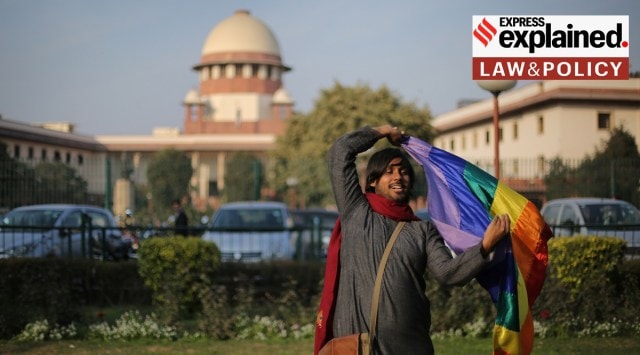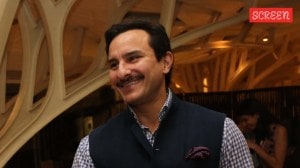Key Supreme Court verdicts that moved the needle on LGBTQ rights in India
On the second day of the hearing, the court heard arguments on the changing legal landscape on LGBTQ rights and the evolution of the right to choose one’s partner. Here are some of the key cases that trace the shift in the law over the years.
 An LGBT rights activist waves the rainbow flag after the Supreme Court referred the section 377 curative petition to a five judge Constitution Bench for further examination in 2016. (Express photo by Oinam Anand)
An LGBT rights activist waves the rainbow flag after the Supreme Court referred the section 377 curative petition to a five judge Constitution Bench for further examination in 2016. (Express photo by Oinam Anand) The Supreme Court on Wednesday continued to hear a batch of pleas seeking legal recognition for same-sex marriages. On the second day of the hearing, the court heard arguments on the changing legal landscape on LGBTQ rights and the evolution of the right to choose one’s partner. Here are some of the key cases that trace the shift in the law over the years.
NALSA v Union of India
Months after a two-judge Bench of the Supreme Court in ‘Suresh Koushal v Union of India’ upheld the constitutional validity of Section 377 of the Indian Penal Code, another Bench in April 2014 affirmed the constitutional rights of transgender persons under Articles 14, 15, 19 and 21 of the Constitution.
In ‘NALSA’, the Court agreed with virtually the same arguments it rejected in Suresh Koushal. The court upheld the right of transgender persons to decide their gender and directed the Centre and state governments to grant legal recognition to their gender identity, such as male, female or the third gender.
KS Puttaswamy v Union of India
In 2017, a nine-judge Bench of the Supreme Court unanimously recognised the right to privacy as a fundamental right under the Constitution. In doing so, the verdict overruled a “discordant note which directly bears upon the evolution of the constitutional jurisprudence on the right to privacy” — the 2013 ‘Suresh Koushal’ ruling.
“The view in Koushal that the High Court had erroneously relied upon international precedents “in its anxiety to protect the so-called rights of LGBT persons” is…in our view, unsustainable. The expression “so-called” seems to suggest the exercise of a liberty in the garb of a right which is illusory. This is an inappropriate construction of the privacy based claims of the LGBT population. Their rights are not “so-called” but are real rights founded on sound constitutional doctrine. They inhere in the right to life. They dwell in privacy and dignity. They constitute the essence of liberty and freedom. Sexual orientation is an essential component of identity. Equal protection demands protection of the identity of every individual without discrimination,” a concurring opinion by Justice DY Chandrachud stated.
Shafin Jahan v Union of India
The SC in March 2018 set aside a Kerala High Court judgment that annulled the marriage of a 24-year-old woman who converted to Islam and married a man of her choice. The ruling recognised the right to choose one’s partner as a facet of the fundamental right to liberty and dignity.
“…The choice of a partner whether within or outside marriage lies within the exclusive domain of each individual. Intimacies of marriage lie within a core zone of privacy, which is inviolable. The absolute right of an individual to choose a life partner is not in the least affected by matters of faith…Social approval for intimate personal decisions is not the basis for recognising them,” the court had held.
Shakti Vahini v Union of India
A three-judge Bench on the SC in March 2018 issued directives to prevent honour killings at the behest of khap panchayats and protect persons who marry without the approval of the panchayats. In the ruling, the Court recognised the right to choose a life partner as a fundamental right.
“…When two adults consensually choose each other as life partners, it is a manifestation of their choice which is recognized under Articles 19 and 21 of the Constitution. Such a right has the sanction of the constitutional law and once that is recognized, the said right needs to be protected and it cannot succumb to the conception of class honour or group thinking which is conceived of on some notion that remotely does not have any legitimacy,” the court had held.
Navtej Johar v Union of India
In August 2018, the SC heard a curative petition against the ‘Koushal’ ruling. A five-judge Constitution Bench struck down IPC Section 377 to the extent that it criminalised homosexuality. The ‘Navtej’ ruling essentially said that the LGBTQ community are equal citizens and underlined that there cannot be discrimination in law based on sexual orientation and gender.
Deepika Singh vs Central Administrative Tribunal
The SC in August last year decided in favour of a woman who was denied maternity leave for her first biological child on the ground that she had already availed the benefit for her two non-biological children. The ruling recognised “atypical” families, including queer marriages, which could not be confined in the traditional parenting roles.
“…Many families do not conform to this expectation to begin with. Familial relationships may take the form of domestic, unmarried partnerships or queer relationships. A household may be a single parent household for any number of reasons, including the death of a spouse, separation, or divorce. Similarly, the guardians and caretakers (who traditionally occupy the roles of the “mother” and the “father”) of children may change with remarriage, adoption, or fostering. These manifestations of love and of families may not be typical but they are as real as their traditional counterparts. Such atypical manifestations of the family unit are equally deserving not only of protection under law but also of the benefits available under social welfare legislation,” Justice Chandrachud stated.
- 01
- 02
- 03
- 04
- 05






































